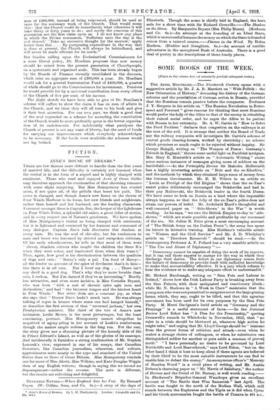FICTION.
ANNE'S HOUSE OF DREAMS.*
THERE are few themes more difficult to handle than the first years of married life, and the difficulty is certainly not lessened when the recital is in the form of a sequel and is highly charged with sentiment. Those who read and enjoyed Anne of Green Gables may therefore approach the continuation of that charming romance with some slight misgiving. But Miss Montgomery has evaded most, if not quite all, of the pitfalls that beset her path. The scene is changed, and though Anne's new home on the shores of Four Winds Harbour is its focus, her new friends and neighbours, rather than herself and her husband, are the leading characters. Foremost amongst these is Captain Jim, the keeper of the lighthouse on Four Winds Point, a splendid old sailor, a great teller of stories, and in every respect one of Nature's gentlemen. We have spoken of Miss Montgomery's recital as being charged with sentiment, but it is lightened and corrected by her humour and command of racy dialogue. Captain Jim's talk illustrates this dualism at every turn. He was the soul of chivalry, but his tenderness to man and beast was leavened by shrewd and outspoken criticism. Of his early schoolmasters, he tells us that most of them were clever, drunken critters who taught the children the three R's when they were sober, and lambasted them when they wasn't." Then, again, how good is his discrimination between the qualities of dogs and cats " Matey's only a pal. I'm fond of Matey— all the fonder on account of the spice of devilment that's in. him— like there is in all cats. But I loved my dog. . . . There isn't any devil in a good dog. That's why they're more lovable than cats, I reckon.. But I'm darned if they're as interesting." Hardly less attractive, and even more incisive, is Miss Cornelia Bryant, who was born "with a sort of chronic spite agin men and Methodists," and had the bitterest tongue and the kindest heart in Four Winds." Her °biter dicta are a constant joy, as when she says that Doctor Dave hadn't much tact. He was always talking of ropes in houses where some one had hanged himself," or describes the first sermon of that "reverend jackass," her own Presbyterian minister. The third of the trio of Anne's new intimates, Leslie Moore, is the most picturesque, but the least convincing, portrait. Miss Montgomery cannot altogether be acquitted of agony-piling in her account of Leslie's misfortunes, though she makes ample redress in. the long run. For the rest, the story gives one a charming picture of the homely side of life in Prince Edward's Island, as well as of the glories of its seascape. And incidentally it furnishes a strong confirmation of Mr. Stephen Leacock's view, expressed in one of his essays, that Canadian literature, like Canadian journalism, education, and culture, approximates more nearly to the type and standard of the United States than to those of Great Britain. Miss Montgomery reminds one far more of Miss Alcott, Miss Wilkins, and Kate Douglas Wiggin than of any English writers; though in saying this we intend no disparagement—rather the reverse. The note is different, but the results are refreshing and delightful.


























 Previous page
Previous page